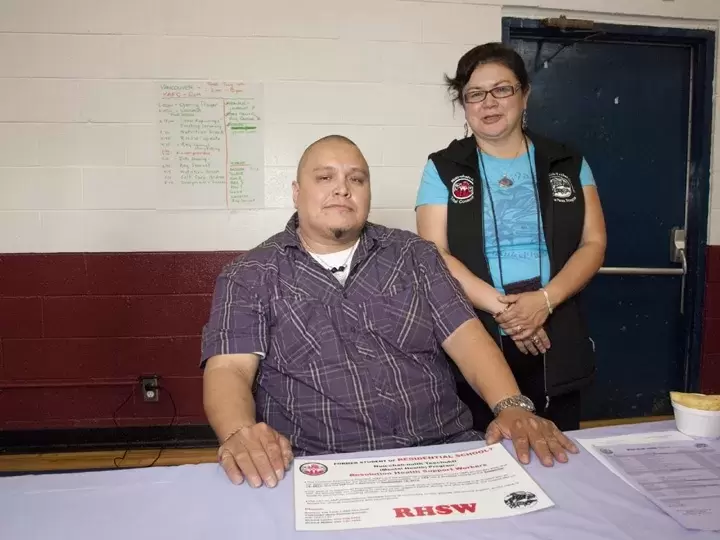First Nation residential school survivors need to be aware of the looming deadline for applying for a component of compensation due to them under the Residential School Survivors Settlement Agreement.
Many Nuu-chah-nulth-aht have applied for the Common Experience Payment (CEP), but there are more who have yet to be encouraged to sign up for the funds.
"There's a fair amount of band members that have [applied], but a few that haven't," said Gary Dawson-Quatell, a Resolution Health Support Worker with the Quu?asa program run through the mental health department of the Nuu-chah-nulth Tribal Council. Some are "sitting on the fence," he said.
Dawson-Quatell, who prefers to be known by his Native name, T'lakwadzi, said that there is no way of knowing just how many Nuu-chah-nulth-aht have applied for funds because the process is completed online. But he assures he is doing his part in getting the information about the CEP to the community and urging them to apply before the Sept. 19 deadline.
"We've really pumped the [deadline] date at gatherings," T'lakwadzi said.
The Common Experience Payment is just one part of the 2007 federal government compensation agreements aimed at providing some restitution to Canada's former residential school students and their families.
Through the Common Experience Payment, federal cash allotments are distributed to approved applicants providing financial compensation for what T'lakwadzi calls "wrongful acts of mental abuse."
He said anyone having spent time in residential school is eligible for CEP. If an applicant is approved for the CEP, the settlement is $10,000 for the first year of school and $3,000 each year enrolled thereafter.
T'lakwadzi said there have been problems within that system of compensation with what he calls the "missing years." He said that Canada holds countless documents archiving details about who went to residential school and the years they were enrolled. But because documents get destroyed or have disappeared from archives, he fears some survivors might not be awarded the total amount of funds they are entitled too.
The CEP acknowledges generally that the residential school system failed Indian children. Those survivors that experienced acts of sexual assault or endured long-term physical pain and suffering because of residential school can go through an Independent Assessment Process [IAP] and hearing, thereby increasing their compensation claim. There is still another year before the deadline for the IAP.
T'lakwadzi confirmed that some Nuu-chah-nulth-aht have applied for an IAP hearing, but he said some are reluctant to go through the process.
T'lakwadzi said some people feel shame in disclosing abuses from that time. And some are overwhelmed by the paperwork involved.
The trauma of having to re-live past hurts is another deterrent for applicants, especially those filing an IAP and having to provide verbal testimony to an adjudicator, said T'lakwadzi.
"They're re-living it, and re-telling the whole story is a very traumatizing thing," he explained. But while difficult, T'lakwadzi said the process can also promote the healing of historic wounds.
"It can allow them to start walking forward," he said.
However, while T'lakwadzi said the IRSSA initiatives are needed, he also said the federal process is not without flaws.
"These deadlines are ridiculous," he said, referring to next month's CEP deadline and the September 2012 deadline for submitting an IAP request.
"I think that this whole system is very oppressive, but it's what Canada has agreed to by way of compensating our people," he said.
"To most Indigenous people in this country, the compensation does not and will not even equate to the injustice which took place at those schools," T'lakwadzi explained. "However, saying that, it is a gesture of acknowledgement from Canada."
When asked for additional information about the CEP, Genevieve Guibert, spokesperson for Aboriginal Affairs and Northern Development Canada, referred Ha-Shilth-Sa to the government Web site.
On the site it states that 96 per cent of the 80,000 estimated former students eligible for CEP have received a payment, while many other applications remain in a state of review.
Canada has approved nearly $1.6 billion in funds for CEP, with the average applicant estimated to receive $20,000.
Those approved for CEP have their application processed within an average of three weeks.
The site also states that to be considered eligible for funds, an applicant must have enrolled in an Indian Residential School recognized under the IRSSA. Furthermore, former students who attended Indian day schools, as well as applications regarding a person that was deceased prior to May 30, 2005, will not be considered.
T'lakwadzi said former day school students, or 'day scholars' as they are called, should not be exempt from the IRSSA initiative as many of those students were also abused.
T'lakwadzi said a workshop aimed at gathering input from the community regarding the need for day scholar funding approval is planned for Nuu-chah-nulth-aht in September.
To apply for CEP before the Sept, 19 deadline, please go to www.servicecanada.gc.ca or call 1-866-699-1742.
Nuu-chah-nulth can also access information regarding CEP and IAP by contacting Gary Dawson-Quatell [T'lakwadzi], Nuu-chah-nulth Resolution Health Support Worker, at 250-724-3939.







